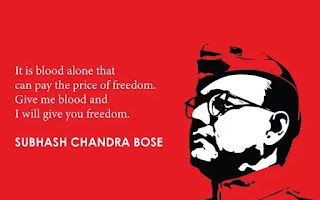INDIAN LEADERS
India's Real Heroes
Netaji Subhash Chandra Bose:
Born: January 23, 1897
Place of Birth: Cuttack, Orissa
Parents: Janakinath Bose (father) and Prabhavati Devi (mother)
Spouse: Emily Schenkel
Children: Anita Bose Pfaff
Education: Ravenshaw Collegiate School, Cuttack; Presidency College, Calcutta; University of Cambridge, England
Associations: Indian National Congress; Forward Bloc; Indian National Army
Movements: Indian Freedom Movement
Political Ideology: Nationalism; Communism; Fascism-inclined;
Religious Beliefs: Hinduism
Publications: The Indian Struggle (1920–1942)
Death: August 18, 1945
Memorial: Ren Koji Temple, Tokyo, Japan; Netaji Bhawan, Kolkata, India
Date of Birth: 23 July 1856 Bal Gangadhar Tilak was a social reformer and freedom fighter. He was one of the prime architects of modern India and strongest advocates of Swaraj (Self Rule). He was universally recognized as the "Father of Indian Movement".
Place of Birth: Ratnagiri, Maharashtra
Parents: Gangadhar Tilak (father) and Parvati bai (mother)
Spouse: Tapi bai renamed Satyabhama bai
Children: Ramabai Vaidya, Parvatibai Kelkar, Vishwanath Balwant Tilak, Rambhau Balwant Tilak, Shridhar Balwant Tilak, and Ramabai Sane.
Education: Deccan College, Government Law College.
Association: Indian National Congress, Indian Home Rule League, Deccan Educational Society
Movement: Indian Independence Movement
Political Ideology: Nationalism, Extremism.
Religious Beliefs: Hinduism
Publications: The Arctic Home in the Vedas (1903); Shrimad Bhagvat Gita Rahasya (1915)
Passed Away: 1 August 1920
Memorial: Tilak Wada, Ratnagiri, Maharashtra
Bhagat Singh:
Born: September 28, 1907
Place of Birth: Village Banga, Tehsil Jaran Wala, District Lyallpur, Punjab (in modern day Pakistan)
Parents: Kishan Singh (father) and Vidyavati Kaur (mother)
Education: D.A.V. High School, Lahore; National College, Lahore
Associations: Nau jawan Bharat Sabha, Hindustan Republican Association, Kirti Kisan Party, Kranti Dal.
Political Ideology: Socialism; Nationalism; Anarchism; Communism
Religious Beliefs: Sikhism (childhood and teen); Atheism (youth)
Publications: Why I Am An Atheist: An Autobiographical Discourse, The Jail Notebook And Other Writings, Ideas of a Nation
Death: Executed on March 23, 1931
Memorial: The National Martyrs Memorial, Hussain Wala, Punjab
Chandrasekhar Azad:
Date of Birth: July 23, 1906
Birth Name: Chandra Shekhar Tiwari
Place of Birth: Bhavra village in Jhabua district of Madhya Pradesh
Parents: Pandit Sita Ram Tiwari (father) and Jagrani Devi (mother)
Education: Sanskrit Pathashala in Varanasi
Association: Hindustan Republican Association (HRA) later renamed Hindustan Socialist Republican Association (HSRA)
Movement: Indian Freedom Struggle
Political Ideology: Liberalism; Socialism; Anarchism
Religious views: Hinduism
Passed Away: February 27, 1931
Memorial: Chandrashekhar Azad Memorial (Shahid Smarak), Orchha, Tikamgarh, Madhya Pradesh
Lal Bahadur Shastri:
Born: 2 October 1904
Place of Birth: Mughal Sarai, Varanasi, Uttar Pradesh
Parents: Sharada Prasad Shrivastava (Father) and Ramdulari Devi (Mother)
Wife: Lalita Devi
Children: Kusum, Hari Krishna, Suman, Anil, Sunil and Ashok
Education: Mahatma Gandhi Kashi Vidyapeeth, Varanasi
Political Association: Indian National Congress
Movement: Indian Independence Movement
Political Ideology: Nationalist; Liberal; Right-wing
Religious views: Hinduism
Passed Away: 11 January 1966
Memorial: Vijay Ghat, New Delhi
Mahatma Gandhi:
Mahatma Gandhi was one of the greatest national and civil rights leaders of the 20th century. He served as a lawyer, politician, and activist in the struggle for social justice and for India’s independence from British rule. Gandhi is internationally esteemed for his doctrine of nonviolent protest (satyagraha) to achieve political and social progress.
Died On: January 30, 1948
Place Of Death: New Delhi, India
Notable Alumni: Inner Temple, London, Samaldas Arts College, Bhavnagar
Cause Of Death: Assassination
Epitaphs: Hey Ram










Comments
Post a Comment